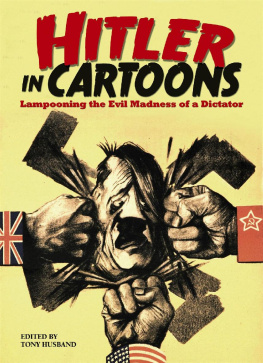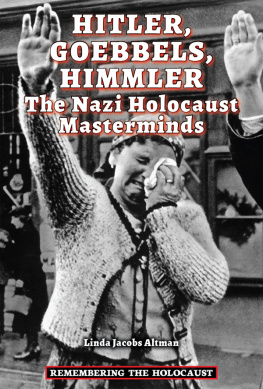Tony Matthews - Tragedy at Évian: How the World Allowed Hitler to Proceed with the Holocaust
Here you can read online Tony Matthews - Tragedy at Évian: How the World Allowed Hitler to Proceed with the Holocaust full text of the book (entire story) in english for free. Download pdf and epub, get meaning, cover and reviews about this ebook. year: 2020, publisher: Big Sky Publishing, genre: Politics. Description of the work, (preface) as well as reviews are available. Best literature library LitArk.com created for fans of good reading and offers a wide selection of genres:
Romance novel
Science fiction
Adventure
Detective
Science
History
Home and family
Prose
Art
Politics
Computer
Non-fiction
Religion
Business
Children
Humor
Choose a favorite category and find really read worthwhile books. Enjoy immersion in the world of imagination, feel the emotions of the characters or learn something new for yourself, make an fascinating discovery.

- Book:Tragedy at Évian: How the World Allowed Hitler to Proceed with the Holocaust
- Author:
- Publisher:Big Sky Publishing
- Genre:
- Year:2020
- Rating:3 / 5
- Favourites:Add to favourites
- Your mark:
- 60
- 1
- 2
- 3
- 4
- 5
Tragedy at Évian: How the World Allowed Hitler to Proceed with the Holocaust: summary, description and annotation
We offer to read an annotation, description, summary or preface (depends on what the author of the book "Tragedy at Évian: How the World Allowed Hitler to Proceed with the Holocaust" wrote himself). If you haven't found the necessary information about the book — write in the comments, we will try to find it.
Tragedy at Évian: How the World Allowed Hitler to Proceed with the Holocaust — read online for free the complete book (whole text) full work
Below is the text of the book, divided by pages. System saving the place of the last page read, allows you to conveniently read the book "Tragedy at Évian: How the World Allowed Hitler to Proceed with the Holocaust" online for free, without having to search again every time where you left off. Put a bookmark, and you can go to the page where you finished reading at any time.
Font size:
Interval:
Bookmark:
About the Author

Tony Matthewes
Author & Historian
T ony Matthews is a Queensland author who has dedicated almost his entire adult life to writing and researching Australian history. He also writes extensively on military and espionage history with a specific emphasis on both world wars. He is the author of more than thirty books including several historical novels.
He worked in the television industry for many years, writing, producing and directing, and during that time wrote a number of highly acclaimed historical documentaries which were broadcast on the Seven Network and ABC Television. He has also written and narrated more than five hundred historical programmes for ABC Radio. Dr Matthews books and articles have been published in Australia, England, the United States and Europe and his television documentaries have been widely distributed to schools, universities, colleges and libraries across Australia.
Please visit the authors website for more details of his published and broadcast works.
Authors website: https://drtonymatthews.weebly.com

Appendix A
Myron C Taylors report to (President Roosevelt
T he following text is Myron C. Taylors highly confidential report to President Roosevelt, written at the end of the vian conference. The text of this report may be found in U.S. Department of State file, 840.48, Refugees, 585. USNA film 1284, reel 20.
On June 23, 1938, Messrs. Pell and Brandt reported for duty with me at Paris. Previously I had read all available material bearing upon the problem of political refugees [or involuntary emigrants as they have come to be called], and I received at my home in Florence the representatives of numerous private organizations. I therefore had a clear picture of the situation when I received my letter of guidance.
In accordance with this letter I immediately went south to establish contact with the representatives of the French, the British, the Argentine and Brazilian governments.
Ambassador Bullitt very kindly arranged to take me on June 24, 1938, to call on M. Bonnet, the French Minister for Foreign Affairs, through whom I made an appointment to meet Senator Henri Berenger, the Chairman of the French Delegation.
On June 27, 1938, accompanied by Mr Pell, I called upon Senator Berenger at the Luxembourg Palace and outlined our ideas with regard to the vian Meeting. Moreover, I gave the Senator a copy of my proposed opening speech and invited his comments. M. Berenger was extremely cordial and pledged his delegation to cooperation with us at vian. Specifically, after some friendly discussion, he agreed to open the meeting as Chairman and appeared to be willing to accept the permanent chairmanship.
On June 28, 1938, I received an informal note from Senator Berenger saying that his Government was in complete agreement with the points contained in my opening statement and repeating his desire to be of real assistance.
In the meantime, I had made rather strenuous efforts through our Embassy at London to establish contact with the British Government. I made it clear that I should be willing to review the situation with Lord Winterton or Sir Michael Palairet at Paris, or would go to London, if it was more convenient for them. After some delay I received word that they, the British, were extremely fearful of publicity and if it could be assured that Sir Michael Palairet would see me privately in Paris, without any word to the press, he could arrange to come. I sent back word that I was as anxious as they to avoid publicity, and pointed out that no word of my presence in Paris had, up to that time, appeared in the press and, in fact, no word did appear until July 4, when the French Foreign Office inspired a brief notice which appeared in local Paris newspapers including the New York Herald Tribune. Accordingly, it was agreed that Sir Michael Palairet would come to Paris on June 31st.
Meanwhile, I had word that the French and British had been discussing the situation. I therefore sent Mr Pell to see Sir Ronald Campbell, Minister at the British Embassy, for the purpose of reassuring him as to our desire to avoid any mention of our meeting in the press. Mr Pell learned, during his conversation with Sir Ronald, that the French had given the British Embassy a rough translation of the text of my proposed speech. Mr Pell, in consequence, handed Sir Ronald a copy of the original English text and said that I hoped it might be transmitted immediately to Lord Winterton.
Sir Michael Palairet came to my private apartment at the Ritz on the afternoon of Thursday, June 31, prepared to discuss with me on the basis of this speech. He expressed the hope that we might make certain changes which I reported to you in the Paris Embassys telegram No 1041, of July 1, 5 p.m. He, moreover, made it clear that the aim of the British was to subordinate any machinery which might be set up at vian to the existing League machinery, and was emphatic in urging the necessity of limiting the scope of the new activity to refugees and potential refugees from Germany including Austria. I took this occasion to give him a copy of our draft resolution which he said would be studied by the services in London, in order that we might open negotiations immediately upon arrival of the British Delegation at vian.
That same day I communicated a copy of the Resolution to Senator Berenger.
Previously, I had made an informal call on Ambassador Le Breton, of the Argentine Republic, at his Embassy. I outlined in full to him our plans for the vian Meeting and it was agreed that we should have further technical discussions during the ensuing week. Unfortunately the very next day Mme. Le Breton died after a plane trip to London, and as a consequence our conversations with the Ambassador were interrupted.
We also communicated with M. Lobo, the Brazilian Delegate, who was at Geneva at the time. He came to Paris, and we reviewed this situation in detail.
Subsequently, he kept in touch with Mr. Pell, who furnished him with such information as he required. We also received calls from most of the other Latin American delegates. Almost without exception they told us that they had received no instruction whatsoever from their governments, that they had merely been told that they were to go to a refugee meeting at vian and discover its purposes. I gave each one of the visiting Ministers a copy of the agenda and such other information as he requested. Several called later on Mr Pell who furnished them with documents and other useful material.
I should add that during this period in Paris, I received representatives of innumerable private organizations and sent none away without a personal interview. Perhaps the most notable of my private callers was Dr. [Otto] Hirsch, the representative of the Jewish community in Germany. Shortly after my arrival in Paris, I had a letter from Consul Geist, at Berlin, saying that Dr. Hirsch would like to discuss the situation with me and that the German authorities had no objection to his coming to Paris. I telegraphed the Embassy at Berlin indicating that if it was deemed advisable for me to see Dr. Hirsch I should be very glad to do so. Dr Hirsch came and was most helpful in giving concrete details as to the situation in Germany and as to the extent of the problem.
On July 5, our Delegation took up quarters at vian. That evening Lord Winterton and Sir Michael Palairet arrived by plane from London and dined with me. In the course of the conversation they took a very strong stand on behalf of the League Commission and said that they could not agree to any machinery which would diminish in any respect the standing of Sir Neill Malcolm, or his organization. They said that they envisaged real difficulty in this respect and hoped that we would agree that the intergovernmental committee should have the statutes of the advisory committee of governments to the League Commission which was called for in the recommendation made by the Council of the League of Nations on May 14, 1938. I said that while our Government was anxious that the organization which we proposed to set up and the League Commission should collaborate and be complementary, we would not be able to agree to participate in an advisory body to the League Commission such as the British Delegates described.
Next pageFont size:
Interval:
Bookmark:
Similar books «Tragedy at Évian: How the World Allowed Hitler to Proceed with the Holocaust»
Look at similar books to Tragedy at Évian: How the World Allowed Hitler to Proceed with the Holocaust. We have selected literature similar in name and meaning in the hope of providing readers with more options to find new, interesting, not yet read works.
Discussion, reviews of the book Tragedy at Évian: How the World Allowed Hitler to Proceed with the Holocaust and just readers' own opinions. Leave your comments, write what you think about the work, its meaning or the main characters. Specify what exactly you liked and what you didn't like, and why you think so.









